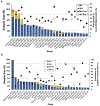HIV, Depression, and Cognitive Impairment in the Era of Effective Antiretroviral Therapy
- PMID: 30661180
- PMCID: PMC6420829
- DOI: 10.1007/s11904-019-00421-0
HIV, Depression, and Cognitive Impairment in the Era of Effective Antiretroviral Therapy
Abstract
Purpose of review: Mental health disorders, especially depression, are prevalent among people living with HIV (PLWH) and are associated with cognitive impairment (CI) among HIV-uninfected (HIV-) individuals. We conducted a comprehensive review of the link between depression and cognition among PLWH.
Recent findings: Studies examining depression and cognition in PLWH report high rates of current (median = 24%) and lifetime depression (42%). There is reliable evidence that depression is associated with overall CI among PLWH, and in the cognitive domains of processing speed, executive function, learning and memory, and motor function. Although few studies have examined the interaction between HIV serostatus and depression on CI, there is no evidence of a stronger association between CI and depression in PLWH compared with HIV- controls. Depression is prevalent and reliably associated with CI in PLWH, with an overall pattern of domain-specific associations similar to that of HIV- individuals.
Keywords: Cognitive impairment; Depression; Depressive symptoms; HAND; HIV.
Conflict of interest statement
Conflict of Interest
The authors declare no conflicts of interest
Figures

References
-
- Bing EG, Burnam MA, Longshore D, Fleishman JA, Sherbourne CD, London AS, et al. Psychiatric disorders and drug use among human immunodeficiency virus-infected adults in the United States. Arch Gen Psychiatry 2001; 58(8):721–728. - PubMed
-
- Orlando M, Burnam MA, Beckman R, Morton SC, London AS, Bing EG, et al. Re-estimating the prevalence of psychiatric disorders in a nationally representative sample of persons receiving care for HIV: results from the HIV Cost and Services Utilization Study. Int J Methods Psychiatr Res 2002; 11(2):75–82. - PMC - PubMed
-
- Do AN, Rosenberg ES, Sullivan PS, Beer L, Strine TW, Schulden JD, et al. Excess burden of depression among HIV-infected persons receiving medical care in the united states: data from the medical monitoring project and the behavioral risk factor surveillance system. PloS one 2014; 9(3):e92842. - PMC - PubMed
Publication types
MeSH terms
Substances
Grants and funding
LinkOut - more resources
Full Text Sources
Medical
Research Materials

